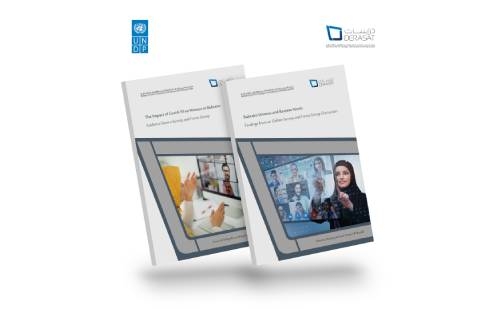Covid-19 impact on working Bahraini women highlighted
TDT | Manama
The Daily Tribune – www.newsofbahrain.com
Two research papers, jointly prepared by the Bahrain Center for Strategic, International and Energy Studies (Derasat) and the United Nations Development Programme (UNDP) and in cooperation with the Supreme Council for Women on the COVID-19 pandemic’s challenges to Bahraini women, recommended accounting for women’s diverse experiences and needs, away from a unified mold shared with men.
The papers, titled, “The Impact of Covid-19 on Women in Bahrain” and “Bahraini Women and Remote Work”, were prepared by Dr Omar Ahmed Al-Ubaydli, Derasat’s Director of Studies and Research, and UNDP Researcher Deema AlMoayyed, called for providing rest periods for some women during challenging times.
A consideration highlighted by the research called for adopting a hybrid work model with hours split-scheduled between home and the workplace, which would in turn enhance business continuity for pregnant, nursing and care-taking mothers, and further called for evaluating accomplished work instead of work hours, in addition to helping staff acquire the computer and application-based skills necessary for remote work.
Research relied on a survey of around 350 Bahraini women and a focus group session with several of them, to identify and discuss the socio-economic impacts created by the pandemic as a challenge to Bahraini women.
The research deduced certain aspects of the pandemic positively affected Bahraini women, such as improved family ties, health, longer time closely spent with family members. However, another set of negative effects included monitoring children during remote education periods, shorter personal care routine sessions, and reduced personal interaction with friends and the extended family.
Another deduction noted that the pandemic posed another opportunity for women to receive support from the remaining family members like husbands, parents, and children. Relationships with nuclear family members improved significantly, but declined with distant relatives, friends, and colleagues due to social distancing.
Most women were able to secure support to handle family disputes and psychological problems during the pandemic, with a recurring observation of large variation in responses. A sub-group from the survey specimen saw essential benefits to their lives because of remote work, derived from increased flexibility and spared commute time, with some reporting higher productivity compared to conventional office work.
A conclusion showed psychological support during the pandemic was among the most pursued needs, especially among middle-aged women. Both papers are published on the Derasat website for those interested in further readings.
Related Posts

